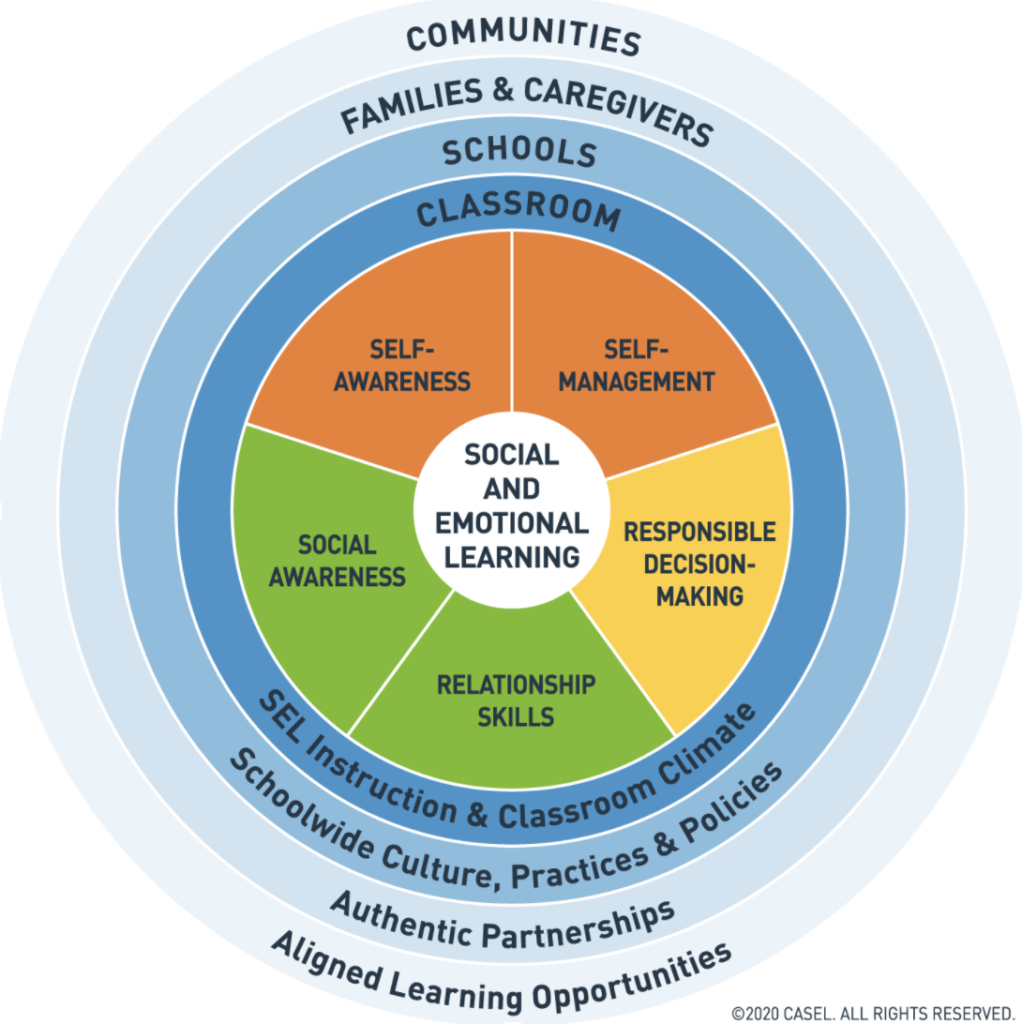
COVID Times: Supporting Your Student’s Social-Emotional Learning
As we navigate the continuous challenges presented by COVID-19 and changes in educational formats, we want to be prepared to create safe, inclusive, and engaged communities for our students.
Collaborative for Academic, Social, and Emotional Learning (CASEL) created a framework to support social-emotional learning, an area that is sorely suffering from the current situation.
The goal is to help students navigate the challenges in a healthy manner and help them leverage unique opportunities to develop socially and emotionally. Here are suggestions for both you and your student.

Self-Awareness
Supporting students to better understand their emotional disposition, needs, and values, including how each of these impacts their behavior.
- Help your students identify the emotions they are feeling. For those who find difficulty describing their feelings verbally, try using the color wheel of emotions. Give your students the opportunity to develop emotional language by identifying a color that relates to their feelings.
- Walk through a past time when students had to wait patiently for an outcome, wish an outcome was different, manage their feelings in the unknown, and ask them how they got through it. This reminds students of resilience and adaptability.
- Once students have identified their emotions, ask them how you and their community can provide support.
Self-Management
Supporting students to help them learn how to manage their emotions and create a constructive path forward.
- Help students to identify a few coping skills they can implement when feeling self-defeating. Examples include taking a walk, playing with kinetic sand, listening to music, reading or writing, etc.
- Encourage students to use “I” language when sharing their thoughts and feelings.
- Provide spaces for comforting silence that allows students to reflect and process.
- Talk through scenarios that might cause students to impulsively react – discuss different ways of responding to various scenarios that may or may not occur. The goal of self-management is to teach skills and develop healthier responses.
Social-Awareness
Supporting students in awareness of their surroundings, including those within it, and developing an open perspective, empathy, and sensitivity.
- Provide prompts to students that expand their current frame of thinking:
- What are 2-3 ways that other people might be thinking about this?
- What are life experiences that inspire you to think this way? How might the life experiences of others differ and impact their opinions?
- If the outcome was different, how might I behave or want others to behave?
- Facilitate a discussion about how the US is a diverse nation that represents many viewpoints, including many that don’t squarely fit into a political affiliation.
- Teach students to look for “the helpers” – it’s a powerful reminder that there’s a lot of good in humanity to balance “bad news”.

Relationship-Building
Supporting students in communicating respectfully and establishing healthy connections with those who think differently.
- Establish ground rules for shared spaces.
- Advise students that conflict is a normal part of life and can lead to new understandings and realizations when respect is facilitated.
- Use the term “dialogue” as compared to “debate” when holding discussions. Dialogue holds a positive connotation and can include more than two voices in a conversation.
- Remind students to connect with their community web of friends, family, teachers, interest groups. Ask them to be intentional in staying connected.
- Encourage an active listening skill like RASA, especially when there are opposing viewpoints.
- Receive what someone is saying without interrupting.
- Appreciate that they shared.
- Summarize their thoughts.
- Ask a question.
Responsible Decision-Making
Supporting students to make thoughtful choices that encourage personal safety, as well as aiming towards building connections versus creating division.
- Similar to the “ground rules” above, you can also create norms and agreements that build a sense of safety for students.
- Discuss boundaries regarding when and where conversations should happen in order to avoid saturating our common areas with political content. These boundaries can help students with their decision-making.
- Help students channel their emotional energy into meaningful action-oriented projects like participating in community service or civic engagement.
Learn with FDA
Fairborn Digital Academy is well-known for giving teens and young adults the chance to succeed in their way, with customized strategies and timelines. Our counselors and Accountability Coaches help define your student’s learning path. Learn more about FDA today!

